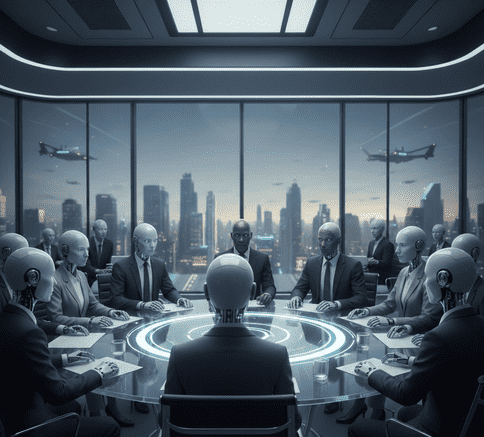AI Leadership & Geopolitical Power- Shaping Nations in the Age of Intelligence
Today, artificial intelligence (AI) has become the bedrock of global power. From reshaping military strategies to influencing global markets and redefining surveillance, AI is altering the architecture of geopolitical dominance. As nations race to lead in AI innovation, they are simultaneously influencing the very fabric of international relations, economic competition, and national security.
The AI Race is On
According to a recent Mary Meeker AI Trends report, AI leadership is set to define geopolitical leadership. One indicator? India’s Reliance Jio made it onto the list of the top 30 global tech firms in 2025. This signifies India’s rising AI Prowess, underscoring the massive digital infrastructure of Reliance Communications. Moreover, the strategic AI initiatives, like the partnership with Nvidia for large language models and the launch of Jio Brain, are positioning India to be a significant player in AI leadership. That’s how it influences geopolitical standing.
Meanwhile, global AI spending is expected to surpass $500 billion by 2027 (IDC), with China and the US leading the charge. China, too, with its “New Generation AI Development Plan,” aims to become the world leader in AI by 2030. Also, the U.S. continues to invest heavily in AI R&D through initiatives such as the CHIPS and Science Act.
The arms race for AI supremacy is no longer confined to Silicon Valley or Beijing; it is a worldwide competition determining who writes the rules for tomorrow.
Military Dominance in the AI Era
AI is rapidly redefining the nature of warfare. Autonomous drones, intelligent battlefield surveillance, and decision-support systems have given rise to a new era of combat readiness. According to the U.S. Department of Defense’s 2024 AI Strategy, AI is being integrated across domains to accelerate decision-making, reduce operational risks, and enhance lethality.
For instance, Israel’s use of AI in its Iron Dome defense system has demonstrated how real-time threat detection and interception can save lives and shift defense paradigms. Similarly, Russia has deployed AI in cyber and hybrid warfare, blending traditional combat with algorithmic operations. This evolution marks a tectonic shift in military power dynamics, where code may be more powerful than conventional weapons.
Economic Superpowers Fueling AI Innovation
AI isn’t just a military asset; it’s a major economic engine. Nations prioritizing AI R&D are attracting top talent, venture capital, and corporate innovation. In 2024, India’s IT Ministry announced a $1.2 billion investment in AI infrastructure under the “IndiaAI” mission to catalyze homegrown innovation. (Source)
AI has already begun transforming sectors like manufacturing, logistics, finance, and healthcare. McKinsey reports that AI could deliver $4.4 trillion in global economic impact annually. This shows that countries leading in AI economic adoption are not only boosting productivity but also influencing global trade norms and economic alliances.
Take South Korea’s Samsung, for instance. In May 2025, Samsung R&D Institute Noida signed a 5-year MoU with IIT Madras to develop next-gen AI chips and workforce talent, aiming to bolster AI-driven economic growth.
The Invisible War: AI and Information Control
We live in the age of information warfare, where AI is its most potent weapon. Deepfakes, synthetic media, and AI-powered bots are increasingly used by state and non-state actors to influence public opinion, manipulate elections, and shape international narratives.
A case in point: the U.S. Senate Intelligence Committee’s 2025 interim report revealed that foreign actors used AI-generated content to interfere in multiple democratic processes. They deployed tens of thousands of fake accounts that mimicked human behavior on platforms like X (formerly Twitter) and TikTok.
Nations wielding such influence mechanisms have an outsized role in shaping global sentiment, enabling them to destabilize rivals without firing a single bullet.
Surveillance and State Control
AI-enabled surveillance technologies—ranging from facial recognition to predictive policing—are now central to how governments maintain control. China’s ‘Social Credit System’ remains one of the most expansive surveillance experiments, powered largely by AI and big data analytics.
According to the 2024 Freedom House report, over 44 countries are now deploying AI-based surveillance tools, often imported from leading tech exporters. While these tools bolster national security, they also raise questions about civil liberties and the global export of authoritarian digital infrastructure.
In democratic societies, the unchecked spread of surveillance tech could risk eroding freedoms unless regulated with robust governance frameworks.
A Widening Global Gap
The AI divide is emerging as the new digital divide. While some nations are surging ahead, many others risk being left behind. Without access to AI infrastructure, skilled talent, or regulatory support, developing countries may fall further into technological dependency. According to a UNESCO AI Readiness Index report, over 40% of countries still lack national AI strategies or frameworks. (Source)
This imbalance could lead to greater geopolitical tensions, exacerbating inequality and hindering collaboration on global issues like climate change, pandemics, and cybersecurity threats.
Challenges: Ethics, Law, and Diplomacy
AI’s rise also brings significant ethical and legal challenges. Issues like algorithmic bias, autonomous weapons, and data privacy demand international regulation. Yet, as of mid-2025, there is no global treaty governing the use of AI in warfare or surveillance. The United Nations AI Advisory Body has already called for a “Digital Geneva Convention” to mitigate risks, but geopolitical rivalries have stalled meaningful progress.
In this vacuum, tech giants and powerful nations are setting the rules, often driven by market incentives or strategic interests, rather than global human rights.
Power Will Belong to the AI-Literate
From warfare to welfare, AI is determining the next generation of global superpowers. The real battle now is not just over chips and algorithms, but over knowledge and leadership. Professionals and organizations that build AI literacy today will shape economies, influence policies, and define ethical boundaries tomorrow.
Become a Leader in AI Geopolitics
To navigate this complex landscape and contribute meaningfully to your nation’s future, now is the time to invest in your AI knowledge. Whether you’re a policymaker, tech leader, researcher, or executive, understanding the geopolitical dimensions of AI is no longer optional.
AI CERTs® offers globally recognized AI certifications designed for professionals who want to stay ahead of the curve. Their programs are tailored for business leaders, cybersecurity experts, and HR professionals alike, empowering you to use AI responsibly and strategically in your field.
The AI revolution is here. Don’t just witness it—lead it.
Explore our 45+ certifications now.
Recent Blogs

FEATURED
The “Kyndryl Shift”: Why Policies Must Now Be Written in Code, Not PDFs
February 12, 2026
FEATURED
From Copilots to Agentic Orchestration: Why Execution, Not Answers, Is the New AI Benchmark
February 12, 2026
FEATURED
How Do We Bridge the $400B Skills Gap in L&D?
February 11, 2026
FEATURED
AI Partnerships: Independence or Dependence?
February 11, 2026
FEATURED
The 2026 “Audit-Ready” Deadline and AI Trust Marks for Partners
February 10, 2026

